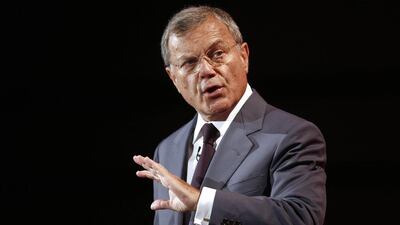The chief executives of Britain’s biggest companies have seen their annual pay fall by an average of £1 million (Dh4.7m) in the past year. But don’t feel too sorry for them: they still earned an average of £4.5m, with some of them taking home a lot more than that.
A new report last week from the High Pay Centre, a think-tank, shows the UK's top 100 bosses were forced last year to take an average 17 per cent decrease in their total packages, which include salary, bonuses, incentives and employer pension contributions. Two of the top earners in 2015, Sir Martin Sorrell of WPP and Bob Dudley of BP, saw their pay fall by a third – £24m in Sorrell’s case. Of 93 FTSE 100 companies for which there are comparable statistics, chief executive pay fell at 47, even though the remaining 46 all witnessed a rise.
The headlines however focused on the falls, the first since 2014, which is generally attributed to a widening revolt among shareholders and a growing acceptance even in board rooms that things are getting out of hand. The public mood has turned against business in an even more savage way than it did in the Wilson/Callaghan era of the 1970s, and so has the mood in Downing Street.
Ever since she stepped into Number 10 last year, Prime Minister Theresa May has been making ominous noises about her determination to improve boardroom behaviour and rein in high-earning chief executives, who she seems to have a visceral dislike of. Mrs Thatcher used to invite senior businessmen into Number 10 on a regular basis, and even encouraged them to drop by after dinner for a good chat, as did Tony Blair and David Cameron. Even Gordon Brown had good friends in the top tiers of business, all of them earning a high multiple of a prime minister’s meagre £142,000 per year salary.
_______________
Read by Ivan Fallon:
India defies the odds as Japan struggles to move on
Rise of electric vehicles irresistible – but Big Oil will not just disappear
In the decade since sub-prime crash, what has been learned?
_______________
But not Mrs May. The prime minister recently warned of the “irrational, unhealthy and growing gap” between the pay of executives and workers. which she believes contributed to the anti-elite sentiment that was apparent in last year's Brexit vote. Next week, the government will publish its long-awaited final corporate governance proposals, which was supposed to reform the whole pay system.
Chief executives however have little to fear. On Monday Mrs May’s aides confirmed that her plan to have more binding votes on remuneration will be dropped, a significant retreat from the crackdown on corporate excess she once threatened. The plan in its new form, when it finally emerges, threatens to be almost meaningless.
Few things however have been more damaging to the reputation of big business (or to a Conservative government which is inevitably linked with big business) than the widening pay differentials between the officers and troops. The average wage in Britain is £28,000 a year. As Tim Roache, head of the GMB union, recently pointed out, “In the real world, it would take the average worker more than 159 years to earn the kind of cash [chief executives] take home in just one."
The big shareholder institutions so far are claiming more victories on executive pay than Mrs May. Following a revolt by almost 60 per cent of its investors who voted against his 2015 pay package of $20m, BP's Bob Dudley had his maximum pay trimmed back by up to U$3.7m over the next three years. Martin Sorrell of WPP meanwhile saw his package drop to £48m, still leaving him as the best-paid boss of a FTSE-listed company.
Sorrell has come to epitomise both the inequalities of pay and the growing power of public and shareholders’ opinion to change it. His case has also been used to highlight the issue of gender inequality into an already heated debate. Sorrell's critics point out that his package is three times that of all the female FTSE chief executives combined (there are only five of them, a long way short of the 30 per cent that the government of Mrs May is aiming for).
The WPP chief executive however argues that, unlike Dudley and almost all other FTSE bosses (including female chief executives), he is really an entrepreneur who started WPP from scratch built it over 30 years into the world’s biggest advertising business. The company's market value today is £21.5bn (although it was £24bn a few weeks ago), and shareholders have benefited hugely from his success, even though more than a fifth voted against WPP's remuneration report earlier this year.
In reality WPP shareholders need to be most concerned about a post-Sorrell future. He is now 72 and there is no clear successor who could run what is arguably the most complex and delicate business in the world.
Having known Mr Sorrell from the time he was the finance director of Saatchi and Saatchi in the 1980s, I for one believe he has earned the £500m of wealth he is credited with. But is the average CEO, who have usually done precious little to create shareholder wealth, worth over £4m a year?
The prime minister is not the only one who doesn’t think so.

